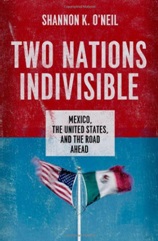
Washington, DC—On June 18, 2013, Shannon O’Neil, Senior Fellow for Latin America Studies at the Council on Foreign Relations, addressed WFPG at an Author Series event on her book Two Nations Indivisible: Mexico, the United States, and the Road Ahead. The event was moderated by WFPG Board Member Diana Villiers Negroponte. In her remarks, O’Neil discussed how Mexico has changed over the last 20 years and the need for Americans to better understand the new nature of US–Mexico relations. Domestically, she spoke about how the growth of Mexico’s economy and urban middle class have had a major impact on education and immigration despite the continued lack of social mobility. O’Neil also addressed the accomplishments of Peña Nieto’s administration in passing constitutional reforms and the remaining challenges it faces in strengthening the rule of law and dealing with corruption.
According to O’Neil, the Mexican government is divided into an economic team and a security team. She described the economic team as efficient and ambitious, having worked together for years. In six months they have passed education, labor, and telecommunications reforms. The growing middle class, which now makes up about half of the population, has benefitted greatly from these efforts. Today, half of Mexicans own a car and 70% own their own home. In contrast, O’Neil argued that the security team is fragmented and often provides the public with contradictory information on their projects. She asserted it is the nature of the issues that has influenced progress in these two areas since there is a general consensus on how to improve the Mexican economy, while solving security issues is more complicated. O’Neil believes that countering corruption within police forces and the court system is the only way to end violence, killings, and kidnappings.
O’Neil also discussed how social mobility remains a big problem for the poor in Mexico and how as a result many Mexicans place great value on their children’s education, viewing it as a pathway to upward mobility. According to O’Neil, the country’s public education system is poorly run by the powerful teachers’ union, which does not hold teachers accountable. She believes that the recent education reforms as well as the imprisonment of the union president are likely to improve the educational system and enhance social mobility.
In terms of US–Mexico relations, O’Neil described the importance of the evolving economic relationship between the two countries. She warned that these ties are often overshadowed by immigration concerns and discussed the impact that harsh US immigration policies have had on Mexican and American citizens. According to O’Neil, millions of American jobs depend on Mexican businesses and consumers, but says that most Americans are not aware of the benefits the US receives from close ties to the Mexican economy. O’Neil thinks both the US and Mexico can work more diligently to engage their colleagues across the border in recognizing mutually advantageous economic ties.